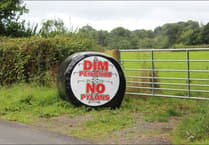IN THE run-up to the last round of local elections, I was a little depressed to be deemed worthy of visits by only two candidates: a local independent, and the representative endorsed by Plaid Cymru. So, I marched up to the polling station feeling overlooked and ready to whinge about lack of interest in rural voters.
However, upon arrival I discovered just three candidates listed, and as such only the Liberal Democrats had failed to tap my door. So, with Labour and Conservatives not on the ballot, with the Liberals not bothering to pitch up (as well as remaining stubbornly stuck on my electoral naughty step for their part in introducing university tuition fees), the choice fell between Plaid and the independent. I re-read leaflets then voted for the independent. A knife-edge decision to reject Plaid that all of a sudden feels vindicated.
During lockdown, Carmarthen East and Dinefwr MP Jonathan Edwards assaulted his wife and was subsequently arrested by Dyfed-Powys Police. After admitting guilt, by accepting his police caution, Edwards was suspended from Plaid Cymru - as one would expect. Remarkably, Edwards did not resign his Westminster seat and to this day sits in Parliament as an independent MP.
If Edwards has the brass neck to squat as an independent, that is a matter for a shameless individual. And if Carmarthen East and Dinefwr re-elect an admitted abuser, that is a matter for that unfortunate constituency. However, an issue of national significance would be if Plaid Cymru again endorsed this self-confessed perpetrator of domestic violence.
This is why, after Plaid Cymru’s recent decision to readmit Edwards into the party, the National Executive Committee recommendation that Edwards should not represent Plaid in Westminster would appear a no-brainer. But this seemingly straightforward judgement has enraged some within the local party. Former Plaid Assembly Member, Rhodri Glyn Thomas, arguing that, ‘having regained his membership of Plaid Cymru, [Edwards] should also regain the party whip within the group in Westminster’.
Plaid’s stuttering response? That ‘the process of determining Mr Edwards’ membership of the Westminster group is yet to be concluded.’ Really? How much consideration does it require to conclude that being a domestic abuser, however occasional, presents an insurmountable barrier to becoming a Plaid Cymru candidate?
Party member and domestic violence campaigner Julie Richards would go further, demanding that Edwards should neither be associated with Plaid nor be a candidate. ‘I believe we should have zero tolerance,’ she said. ‘In terms of values, as a party this puts it all into question.’ Adding, ‘I can’t be in a party that doesn’t take this and tackle this seriously.’
I am not surprised. Memories of being let down by presumed allies are particularly difficult to forgive. And not taking a swift and principled stand on an issue as important, as problematic, as persistent as violence against women will ensure Plaid Cymru join Liberal Democrats on that worst of political naughty steps; a party who signal virtuous instincts, claim progressive attributes, but when the chips fall inconveniently, demonstrate that political expediency supersedes these values. Hardly the vote winner.
For, amid depressing reports that incidents of domestic abuse are again increasing across England and Wales, it is imperative that violence against women is always faced down, always confronted as the grave societal problem it is. So Julie Richards will not be alone in concluding she could no more be associated with a political party supporting a domestic abuser than a party endorsing perpetrators of antisemitic, racist or homophobic assaults.
The #MeToo conversation already feels distant. Let us hope Plaid Cymru’s self-destructive deliberations are not evidence that here in Wales those important voices were never genuinely heard.





Comments
This article has no comments yet. Be the first to leave a comment.